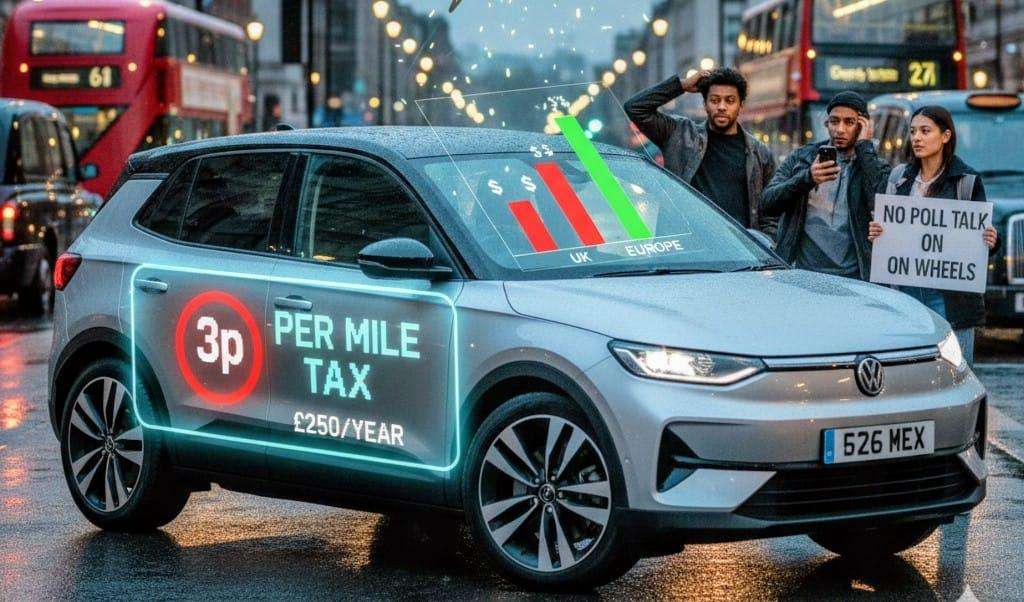Chancellor Rachel Reeves is reportedly set to unveil a politically contentious 3 pence per mile charge for electric vehicles (EVs) in the November 26 Budget, a measure a leading motoring group has already branded a "poll tax on wheels." This move, slated for implementation in 2028 after a consultation, is an attempt by the Treasury to plug a widening revenue gap caused by the successful transition of drivers away from petrol and diesel cars and the corresponding reduction in fuel duty receipts.
The proposed policy, as reported by the Daily Telegraph, would cost an average EV driver approximately £250 annually. It would require users to estimate their forthcoming 12 months' mileage and pre-pay an amount on top of the already re-introduced Vehicle Excise Duty (VED). Drivers clocking fewer miles would see a carry-over, while those exceeding their estimate would need to top up the payment.
The Political and Economic Backlash
The reaction from motoring groups has been swift and critical. AA president Edmund King cautioned that the Government must "tread carefully" to avoid slowing the essential transition to EVs, noting that the Zero Emission Vehicle (ZEV) mandate for 28% of new car sales this year is already expected to be missed, with sales running at just 22%. He demanded detail to ensure the new tax is "equitable or a poll tax on wheels," referencing the notoriously unpopular fixed payment introduced by a previous government in 1989/90 that led to violent protests.
Ginny Buckley, chief executive of Electrifying.com, slammed the proposal as "mixed messaging," arguing that the threat of new taxes contradicts the encouragement for drivers to go electric. She highlights that this new charge would disproportionately penalise those who rely on public chargers and already pay more per mile than many petrol drivers, as well as punishing early adopters who switched "in good faith, based on promised savings." Her call for a simultaneous unfreezing of fuel duty, which has been stagnant for over 14 years, underscores the complexity of reforming vehicle usage taxation. Electric Vehicles UK chief executive Tanya Sinclair agreed that the system "needs fundamental reform" but stressed the necessity of a careful, transparent, and multi-year consultation process.
UK Car Costs vs. European Neighbours
The introduction of this new mileage levy will intensify the debate over the overall cost of motoring in the UK compared to other major European economies, a cost that has generally been rising.
Vehicle Excise Duty (VED) Changes: The UK has already made a significant shift in its EV taxation framework. As of April 1, 2025, the VED exemption for EVs was removed. Most EV drivers now pay a standard rate of £195 per year from their second year of registration, a rate comparable to the standard VED for most petrol/diesel cars. New EVs registered after this date pay a nominal £10 first-year rate. Furthermore, the ‘luxury car tax’ supplement (£425 annually for five years) for vehicles with a list price exceeding £40,000 now also applies to EVs, pushing the annual VED for more expensive models up to £620 for five years.
Overall Ownership Costs: Updated international statistics reveal a nuanced picture of car ownership costs across Europe, which factor in depreciation, insurance, tax, maintenance, and fuel/energy spend. The UK's average annual cost of car ownership in 2025 is estimated to be around £9,405 (or $9,405/€8,760). While countries like Denmark and the Netherlands rank higher for overall expense, key competitors for the UK show a different trend:
- France: Estimated average annual car ownership cost of approximately £7,942 (€7,942).
- Germany: Estimated average annual car ownership cost of approximately £9,084 (€9,084).
Crucially, despite the rising tax burden, the relative affordability of car ownership, when compared to the UK's Gross Domestic Product (GDP) per capita, suggests that the total cost of ownership in the UK is low compared to GDP, similar to Greece, and more favourable than in nations like the Netherlands and Italy.
The EV Cost Per Mile: The proposed 3p per mile charge, while adding a new tax layer, must be viewed against the current cost of running an EV. With EV-specific energy tariffs, many home chargers can achieve a cost of as low as 3p per mile for electricity. This means the proposed tax essentially doubles the running cost for the most cost-efficient home chargers, wiping out the per-mile savings for those drivers compared to the cost of electricity alone. For context, the estimated cost per mile for a petrol car sits significantly higher, often between 10p and 12p per mile.
The Path Ahead
The proposed 3p per mile charge is a direct attempt to replace the estimated £5 billion in annual lost fuel duty revenue. Journey examples illustrate the direct cost impact: a trip from London to Edinburgh could cost an extra £12, while Cambridge to Bristol would be £5. The Treasury faces a difficult task in designing a system that is politically acceptable, simple to administer, and truly equitable across vehicle types without undermining the drive towards net zero emissions. As the Chancellor prepares to deliver the Budget, the debate over taxing Britain's electric future is just beginning.








.svg)

.jpg)
.jpg)
.jpg)
.jpg)